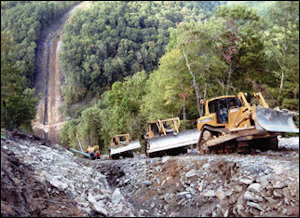
Pipeline construction.
The proposed Atlantic Coast Pipeline (ACP) is highly controversial in Augusta County, where property owners fear pipeline construction will jeopardize water supplies, create a safety hazard for nearby residents, and drive down property values. But hundreds of mechanics, welders, electricians and other blue-collar workers see the $5 billion project as a potential boon.
By noon Thursday, 157 people had signed up at the Augusta Expo put on by the ACP to inform local vendors and workers of opportunities to work on the 600-mile pipeline, according to the News Virginian.
At peak construction in 2018, said ACP spokesman Aaron Ruby, the pipeline will employ 7,220 workers.
Wrote the News Virginian:
Scott Bazzarre, the founder and president of Budget Electrical & Mechanical in Palmyra, wants to be considered for electrical work on the pipeline. He calls the pipeline a boon for workers like him and for the economy. “It’s a no-brainer, not just for the tax base but for a struggling economy.”
Unlike landowners, who will have to live with the pipeline as a permanent fixture on their property, construction workers will benefit only for the duration of the construction project. But there are undoubtedly thousands of workers who think like Bazarre: “We have to have good-paying jobs for my kids and grandkids.”
Bacon’s bottom line: Is it a stretch to suggest that the ACP pipeline controversy reflects the same societal schisms as the 2016 election: the propertied, educated class versus blue collar workers struggling to survive economically? Such a framework over-simplifies a complex reality, but I think there’s something to it. Even though Virginia’s unemployment rate stands at 3.7%, theoretically full employment, rural/small town Virginia has a higher jobless rate, and the “unemployment” figures don’t take into account discouraged workers who have dropped out of the workforce. Pipeline construction would throw construction workers a lifeline.
On the other hand, property owners can’t be blamed for wanting to be left alone. The value of land in the Shenandoah Valley is determined increasingly by aesthetics — bucolic rural landscapes, mountain views, wildlife habitats — not by farming/timbering income streams that traditionally determine compensation for land taken by eminent domain. One can argue that Virginia’s eminent-domain laws do not provide fair compensation for lost value.
In any case, Virginia’s blue collar workers have been largely invisible in the pipeline debate until now. Don’t be surprised to see ACP maximize their exposure.


